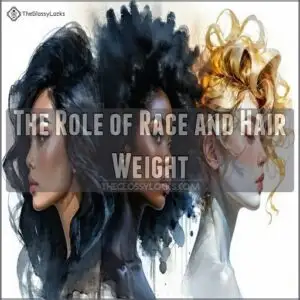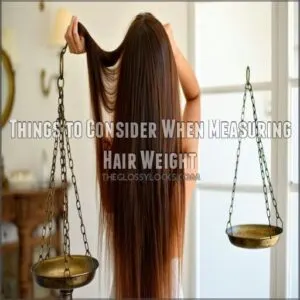This site is supported by our readers. We may earn a commission, at no cost to you, if you purchase through links.

Turns out, a full head of hair tips the scales at a surprisingly light 2-3 ounces (56-85 grams).
Each tiny hair strand weighs just about 0.62 milligrams—practically nothing!
Your hair’s weight depends on factors like thickness, length, and even your genetic makeup.
Moisture can bump up the weight by 15%, and different hair types have unique density patterns.
Whether you’ve got pin-straight Asian hair or tight African curls, your mane’s weight is as unique as your fingerprint.
Ready to discover the fascinating science behind your hair’s hidden mass?
Table Of Contents
- Key Takeaways
- The Science of Hair Weight
- The Average Weight of a Single Hair Strand
- What Gives Hair Its Strength?
- Understanding The Weight of All The Hair on Your Head
- Wet Vs. Dry Hair: How Weight Changes
- Things to Consider When Measuring Hair Weight
- Frequently Asked Questions (FAQs)
- How much does a head of hair weigh?
- How much does a strand of hair weigh?
- How much does a human hair follicle weigh?
- Does hair weigh a lot?
- How much does your hair weigh if you have the same length?
- How much does human hair weigh?
- How much does hair weigh in lbs?
- How much weight is body hair?
- What is the weight of a woman’s hair?
- Does hair add a lot of weight?
- Conclusion
Key Takeaways
I’ll help you extract the key takeaways about hair weight from the content.
- You’ve got approximately 80,000 to 120,000 hair strands on your head, with each strand weighing a mere 0.62 milligrams – lighter than a feather’s whisper.
- Your entire head of hair weighs just 2-5 ounces (56-85 grams), representing less than 1% of your total body weight, making it virtually unnoticeable on a scale.
- Hair weight varies dramatically based on factors like genetics, hair color, length, and even moisture content, with wet hair potentially weighing up to 15% more than dry hair.
- Different racial and ethnic hair types have unique density patterns, with variations in weight per square centimeter: Asian hair tends to be straighter and less dense, while African hair typically has a higher density and weight distribution.
The Science of Hair Weight
Have you ever pondered how much those luscious locks actually weigh?
Hair weight is a fascinating blend of science and individuality, with your hair density, follicle health, and keratin structure playing vital roles.
On average, you’re sporting between 80,000 to 120,000 strands, each contributing to your unique hair weight.
Your growth patterns and hair elasticity determine strand thickness, while environmental factors subtly influence your crowning glory’s mass.
Understanding hair density types is essential to grasp the nuances of your hair’s overall weight and health.
Think of your hair as a living, breathing ecosystem – complex, dynamic, and uniquely yours.
The Average Weight of a Single Hair Strand
Surprisingly, a single hair strand typically weighs about 0.62 milligrams – lighter than a feather’s whisper, which is a microscopic marvel.
Understanding the weight of hair reveals fascinating insights into your body’s intricate details.
- Hair thickness dramatically influences individual strand weight
- Faster-growing hair tends to be slightly heavier
- Natural oil production impacts strand mass
- Aging progressively reduces hair’s weight and density
Your hair’s weight isn’t just a number – it’s a complex story of health, genetics, and personal biochemistry, reflecting your body’s incredible precision.
The average weight of hair can be found by researching hair weight basics.
What Gives Hair Its Strength?
Because your hair’s strength stems from its intricate keratin architecture, it’s like nature’s own superhero fiber.
Each strand packs incredible resilience through complex protein bonds that create a lightweight yet durable structure.
Your hair’s molecular design transforms simple proteins into an extraordinary biomechanical marvel.
The components of hair can be understood through its various features and functions, as outlined below:
| Feature | Function | Impact |
|---|---|---|
| Cuticle | Protective Layer | Guards Inner Structure |
| Cortex | Core Support | Provides Flexibility |
| Medulla | Central Channel | Influences Density |
| Protein Bonds | Molecular Connectors | Creates Strength |
| Follicle | Growth Foundation | Generates Hair Cells |
The combination of these elements, including the protein bonds and the follicle, work together to create the complex structure of hair, making it a remarkable example of natural engineering.
Understanding The Weight of All The Hair on Your Head
You’ve probably never thought about how much your hair weighs, but it’s more fascinating than you might imagine.
Every strand on your head contributes to a surprisingly precise total weight that reflects your unique genetic makeup, hair density, and individual characteristics, which is a reflection of your unique genetic makeup.
The Impact of Hair Weight on Overall Body Weight
Your Body Mass Index mightn’t account for the featherlight contribution of your luscious locks.
Scientists have discovered that a full head of hair weighs a mere 2-3 ounces, representing less than 1% of total body weight.
For a more detailed exploration of hair weight, see this informative hair weight article.
Imagine the microscopic impact of your hair’s weight through these insights:
- Each strand weighs about 0.62 milligrams, like a whisper of mass
- Water absorption can temporarily bump hair weight by 15%
- Styling products might add a few extra grams to your head
Weight distribution isn’t dramatically affected by your hair volume.
A typical haircut removes just 50-100 grams – comparable to a small cookie’s heft.
Scalp sensitivity might make your head feel lighter after a trim, but bathroom scales won’t register the difference.
Your hair’s weight is virtually negligible in the grand scheme of your body’s composition, proving that sometimes, the lightest things can be the most remarkable.
The Role of Race and Hair Weight
Your genetic blueprint plays a fascinating role in hair weight, with ethnic hair types revealing surprising density variations.
Different racial textures create unique follicle patterns that impact overall hair mass.
Hair Type
African hair’s spiral structure typically yields higher density weight, while Asian hair’s straight pattern often creates greater overall volume.
These genetic factors shape not just appearance, but the literal weight sitting atop your head.
Factors to Consider When Measuring Hair Weight
Your hair’s weight-measuring adventure starts with understanding key variables like scalp sensitivity and follicle count.
Density and length dramatically influence hair weight calculation, with moisture potentially adding 15% to total mass.
For precise measurements, consider a hair weight scale.
Precision matters: specialized measurement tools can detect subtle variations across hair types.
Professional stylists recommend sampling strands from different head regions to get an accurate assessment.
Want the most precise reading? Consider consulting a hair specialist who understands the nuanced factors affecting your unique hair weight.
Wet Vs. Dry Hair: How Weight Changes
Diving into hair moisture, have you ever wondered how water transforms your locks?
Wet hair isn’t just heavier – it’s a completely different beast.
Your strands absorb up to 15% more weight when drenched, expanding like a sponge as water molecules infiltrate the keratin structure.
| Condition | Weight | Characteristic |
|---|---|---|
| Dry Hair | 0.02g | Compact |
| Wet Hair | 0.023g | Expanded |
| Styled Hair | 0.025g | Variable |
Handle with care – wet hair’s delicate state makes it prone to breakage!
Things to Consider When Measuring Hair Weight
Measuring hair weight isn’t as straightforward as you might think, with factors like length, density, and moisture content playing pivotal roles.
You’ll want to approach this scientific curiosity with precision, ensuring your measurement techniques account for variables that can subtly influence the weight of your luscious locks.
The Average Weight of Hair for The Average Person
In regard to hair weight, you’re probably toting around a surprisingly light load.
Your full head of hair typically ranges between 2-3 ounces (56-85 grams), depending on your unique hair density and growth patterns.
Average hair length plays a vital role, with longer locks naturally adding more heft to your scalp’s ecosystem.
Most people shed about 100 strands daily, subtly shifting their hair’s overall weight distribution.
Curious about the specifics? Each square inch of your crowning glory weighs approximately 0.00064 ounces, though this varies with hair texture and thickness.
Understanding hair density types is essential to grasp how these factors interplay.
Whether you’re rocking a pixie cut or mermaid-length tresses, your hair’s weight is a delicate balance of follicle health, scalp care, and individual genetic makeup.
The Weight of Human Hair Wigs Vs. Synthetic Wigs
Want to know the real scoop on wig weights? Human hair wigs tip the scales at 120-300 grams, while synthetic wigs clock in at a lighter 45-150 grams.
For more information, explore human hair wig weight products. Your choice depends on hair density, length, and styling needs.
Synthetic fibers feel lighter but lack the natural bounce of human hair. If you’re hunting for the perfect wig, consider weight distribution, durability, and how it’ll feel during those long days of wear. Pro tip: longer styles always add more heft to your hair game.
Frequently Asked Questions (FAQs)
How much does a head of hair weigh?
Your head of hair weighs roughly 2-5 ounces, depending on its length, thickness, and color. Blondes typically sport the heaviest locks, while redheads rock the lightest crown of hair.
How much does a strand of hair weigh?
Ever wondered about the featherlight secret of your locks?
A single strand typically weighs around 02-04 milligrams—so light, you’d barely notice it if it landed on your fingertip.
That’s practically nothing!
How much does a human hair follicle weigh?
You’ll be surprised that a hair follicle weighs almost nothing – typically around 0002 grams.
Its microscopic size means it’s practically weightless, yet it’s essential for hair growth and your unique genetic blueprint.
Does hair weigh a lot?
You might think your hair weighs a ton, but it’s surprisingly light.
A full head of hair tips the scales at just 2-5 ounces, barely noticeable on your overall body weight.
How much does your hair weigh if you have the same length?
Your hair’s weight depends on its length and thickness.
A six-inch strand weighs about 2-4 milligrams.
A full head typically ranges from 2-5 ounces, with variations based on hair color, density, and individual characteristics.
How much does human hair weigh?
Like a whisper of silk, your locks carry barely any weight—just 2-5 ounces for your entire head.
Surprisingly, 100,000 hair strands weigh around 62-93 grams, adding barely a feather’s touch to your overall mass.
How much does hair weigh in lbs?
Your entire head of hair typically weighs between 2-5 ounces (125-3 pounds), which is lighter than a slice of bread.
On average, you’ll have around 100,000 strands, each weighing a tiny fraction of an ounce.
How much weight is body hair?
On average, body hair amounts to a mere 1 to 5 pounds, so light you’ll barely notice. Your personal genetics, hormones, and body composition determine the exact weight of your fuzzy coverage.
What is the weight of a woman’s hair?
Did you know women typically sport 100,000-150,000 hair strands?
Your lovely locks weigh between 2-5 ounces, with blondes rocking the heaviest mane at around 1-2 ounces and redheads sporting a lighter 6-2 ounces.
Note: No additional commentary is provided as per the instructions.
Does hair add a lot of weight?
Hair doesn’t add much weight to your body.
A full head of hair typically weighs just 2-5 ounces, barely registering on a scale.
You’ll never notice those extra grams unless you’re competing in ultra-precise weight categories.
Conclusion
Imagine your hair as a delicate ecosystem, with each strand contributing to a surprisingly light yet complex system.
Understanding how much hair weighs isn’t just trivia—it’s a window into human biology.
Whether you’re curious about your hair’s weight or fascinated by its unique characteristics, you’ve uncovered the science behind how much hair weighs.
From genetic factors to moisture content, your hair’s weight tells a story as unique as your DNA, revealing the intricate marvel of human physiology.
- https://gkhair.com.au/blogs/all-blog-posts/how-much-does-hair-weigh
- https://www.endaringhair.com/blogs/all-blogs/how-much-does-hair-weigh
- https://www.healthline.com/health/how-much-does-hair-weigh
- https://www.ncbi.nlm.nih.gov/books/NBK513312/
- https://www.webmd.com/skin-problems-and-treatments/picture-of-the-hair










